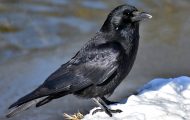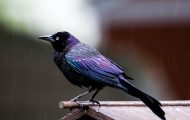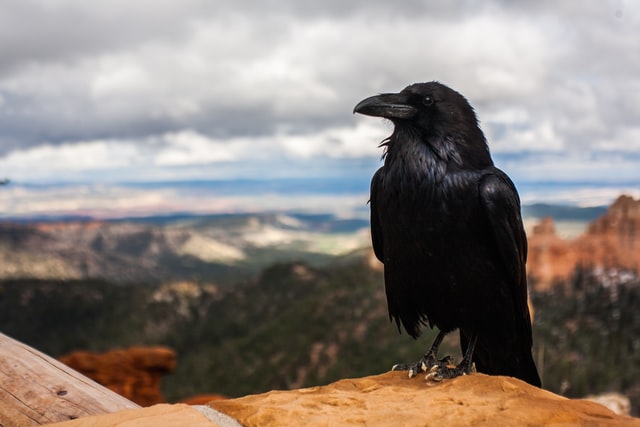
You may be wondering right now on how to get rid of those irritating crows. Crow extermination has long been done in many places. So, if you want to know the details on how to get rid of crows, you’ve come to the right place. They appear to be everywhere, especially throughout the spring and summer. Even if you don’t see it, the crow bird’s unmistakable caw warns you of its existence.
These coal-black, flying insects may ruin lawns, scatter waste, terrorize pets, and leave unsightly droppings that can transmit the disease during other times of the year. Crow birds are not selective when it comes to eating. Crows are well-known scavengers, and they may be seen scavenging around trashcans and dead animals.
Getting Rid of Crows
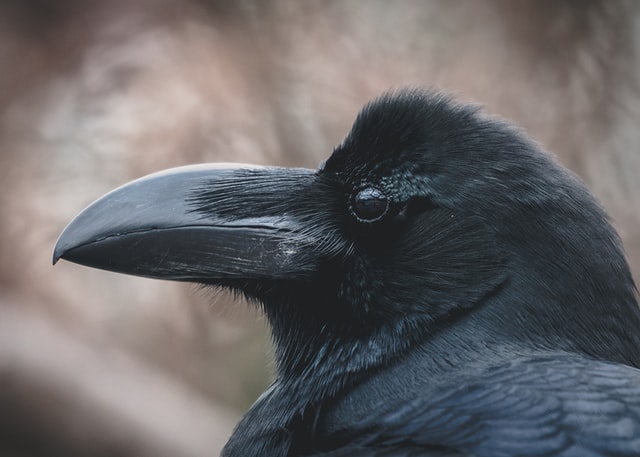
To completely get rid of those crows, you must use tactics that scare them away. However, when you frighten them away make sure you do it without injuring or risking any animals by using these factors.
✔️You Should Keep Your Surroundings Clean
Crows enjoy staying in filthy areas, regardless of what they are. They, too, wander about in quest of food. If you maintain your yard clean, they won’t be able to locate anything to eat and will be forced to go somewhere else, wasting their time. This will keep crows away from your yard.
Keep all rubbish and cooking leftovers in your trash can. Put no food, no matter how tiny or huge, on your garden’s grass. Crows can spread seeds on the ground, so keep them away from the feeders.
✔️Remove Unnecessary Food and Water
There is no known logical basis for crows to visit your yard if it lacks food and water supplies. However, if you see cows flying over your yard, it is likely that they have found a reliable supply of food and water in your yard and are thriving.
✔️Display Reflective Objects
Crows dislike sparkling items because they irritate their eyes. Shiny items, they believe, are deadly weapons that make them anxious. If you want to keep them away from your yard or garden, hang any bright object that will flutter in the wind.
✔️Install Bird Feeders for Small Birds
It is preferable to install bird feeders that only admit certain songbirds. Large birds, such as crows, ravens, and jackdaws, are unable to perch and feed on the bird feeders.
If you have bird feeders in your yard, keep them clean at all times, especially before refilling them with the nest batch. Also, be careful to clean any spilled seeds from beneath the feeders. They may attract crows to your yard to feast on.
✔️Transparent Bird Gel
To keep crows away from your yard, use translucent bird gel, a non-toxic sticky material. Crows find the sticky gel repulsive, leading them to see your yard as an unsuitable nesting place. In addition, crows find it a little stinky. That is why crows will not come to your yard. Even if they do appear, they will quickly tire and fly away. We recommend JT Eaton’s 4 The Birds Bird Repellent Gel or Bird-X 54-1 Proof Bird Repellent Gel. Another alternative is SpectrumV Holographic Bird Gel by Bird B Gone.
✔️Put a Cover on your Trash
After you’ve cleaned up your yard by putting all rubbish and cooking leftovers in the trash, you’ll need to cover the trash so crows can’t get to it. If they don’t find anything appetizing in your yard, they won’t return back.
The ideal solution is to cover the garbage with light lids and then position it in a location where crows are unlikely to approach. It is preferable to eliminate garbage from your yard as soon as possible. Otherwise, your pets may leave the trash out at night, which crows like in the morning.
✔️You can Trim Dead Branches of Trees
If you have towering trees in your yard, crows will likely find them the best roost and nest locations. Trim dead branches to keep these pesky birds away from your yard. As a result, you can keep a huge number of crows away from your trees.
If at all possible, keep your yard open by removing undesirable trees, shrubs, and bushes. At least once a week, pay attention to the trees. Crows may return and build their home if you do not give your trees enough attention.
Intriguing Facts about Crows
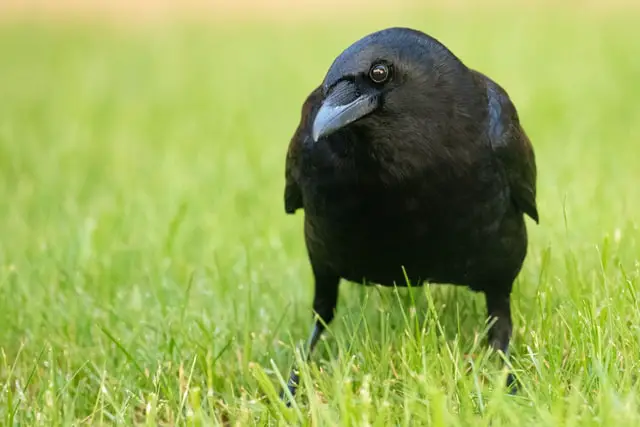
Crows have been characterized as the sharpest birds on the planet and being noisy and mischievous. Aside from their reputation as a terrible omen, these birds have a lot to offer.
❕Crows make their Own Tools
They are intelligent enough to invent their own tools. And they can also learn to build tools by remembering and replicating designs. Crows also do not limit themselves to utilizing only one material to make tools.
They also developed to combine numerous things that would otherwise be useless. Previously, only humans and big apes were observed manufacturing such sophisticated tools.
❕Crows have Big Brains
The brains of crows are rather big in comparison to their bodies. Their brain-to-body weight ratio is comparable to that of dolphins and big apes. Despite their tiny stature, their comparatively large brains offer them a distinct cognitive edge.
Crows have a strong recall and may remember faces for up to a half-decade due to their large brain size. They can also recall individual food container colors for roughly a year.
❕Crows have Funerals for their Dead
This is one of the well-documented yet little-understood crow facts. When a crow dies, other crows form a circle around their remains, simulating a funeral procession. According to the researchers, the birds may be learning from their fallen neighbors.
These funerals provide kids the chance to learn about potentially harmful circumstances, animals, or humans.
❕Crows “Gossip”
They learn about hazardous individuals through social learning and will band up on people with whom other crows have had a bad encounter. Even crows who have never seen the person before will join in and react violently.
❕Crows Frequently Mate for Life
These clever birds are very sociable and frequently form close-knit families. A crow couple will usually stay together until one of them dies. Both the male and female will assist in the construction of nests and the rearing of chicks.
On the other hand, crows may be extremely promiscuous when it comes to mating – some birds will mate with other crows outside of their partnership.
❕Crows Attack Bigger Predators
Crows engage in mobbing behavior or act together to chase them away, to guard their territory. This may be a noisy activity, with crows swooping in to annoy would-be predators or invaders.
When they band together, they can even take on much larger opponents, such as hawks and owls. Crows may even harass other animals when they are alone at times.
❕Crow Live a Long Life
Crows have a lifetime of about 20 years, with captive crows surviving longer than wild crows. For example, the oldest wild crow survived almost to the age of 30, whereas the oldest reported captive crow lived to 59.
❕Crows can cause Blackouts
Crows are common in Japan, and their presence in cities may cause problems for residents and energy suppliers. Crows construct nests on electricity lines and transformers, frequently utilizing metal hangers or wires, resulting in short circuits and blackouts.
As a remedy, a power company began placing fake nests so that crows would not have to build their own.
❕Crows are Prepared
These clever birds think strategically and prepare their movements before acting, much like chess players. For example, researchers discovered that crows could solve consecutive puzzles, which would not be feasible if the birds couldn’t plan ahead.
❕Crows set Goals
They behave more positively after successfully utilizing a tool, similar to the sense of accomplishment that humans get after finishing a task. Crows, like humans, scientists believe, like the process of having something to do.
❕Crows can save their Sustenance
They do not simply leave leftover food lying around. Instead, when they have a surplus of food, they store it in caches for later consumption. Crows bury food in various locations or conceal it in leaves and other things. When they become hungry again, they return to their caching locations and recover the food.
Crows frequently have favorite locations to keep their food, and they will place marks on top of their hiding spots to remember where they stored the food. They are also aware that criminals may steal their stored food, so they shift it around from time to time.
❕Crows Recognize Human Faces
They have the ability to recall human faces; therefore you must be careful not to mistreat them. They have been observed recognizing humans linked with stressful events, such as enslaving them or murdering one of their fellow crows. A crow may remember your face for up to five years after you make an impression on it.
❕Crows Rub ants on their Feathers
They engage in a practice known as “anting.” They seek out areas with a high concentration of ants and then they rub them on their feathers and skin. When ants become agitated, they produce formic acid, which repellents against parasites and dangerous bacteria.
❕Crows Steal from Predators
They can also work together to find food. For example, crows have been observed tugging on predators’ tails to distract them, allowing other crows to steal their meal.
❕Crows have Dialects
The Crow, like other songbirds, primarily communicate through complex vocalizations. The tone of crow cries varies by area, much like dialects. When a crow moves to a new location, it adopts the tone of the dominating crows in the area.
❕Crows are Popular in Mythology
They may be found all over the world and are the subject of several tales, literature, and folklore. Crow symbolism differs across the world, with some thinking they bring good luck and others saying they bring ill luck.
They’ve been characterized as bearers of omens, messengers, or rain. In addition, their dark feathers and carrion-eating habits have made them linked with death and witchcraft.
❕Crows Understand Analogies
They can grasp analogies as well as solve puzzles, and plan their future movements. An analogy is a relationship between two items that have similarities and differences. They may discern the correlations of similarities and differences even without instruction, which is a hallmark of analogical thinking.
Ways to Avoid Crow Attacks
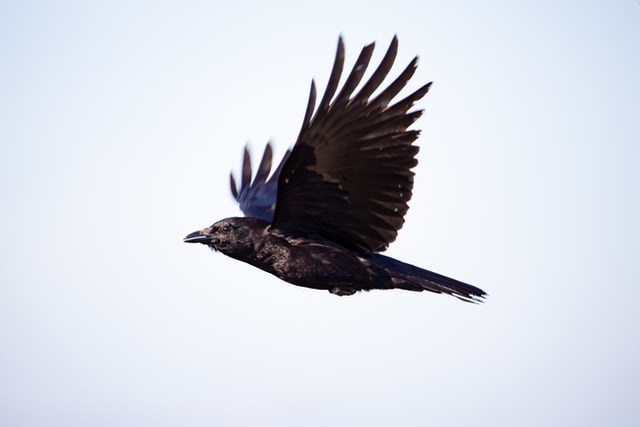
Crows are usually harmless, but there will be instances when they are motivated to attack you because of anything you have, wear, or did.
👍You can Bring an Umbrella
Carrying an umbrella is the greatest method to keep birds at bay. When a swarm of crows attacks you, you can use it to conceal and defend yourself. In addition, you can utilize it to avoid them without inflicting significant harm to them.
👍Pick another Route
They will not pursue you if you merely cross the street and they are just attacking you because they believe their nest is in jeopardy. If you are the target of a particularly grumpy crow that, for whatever reason, dislikes your charm and good looks, choose a different path.
👍You can Wear a Hat
Wear a cap if you’re concerned about your hair or your new hairdo being pulled out. You will not only look good, but your head will be safe as well. If they ever do it, this will shield your face and head from their attack.
👍Do NOT Harm them
If you are being pursued, try not to strike or injure them. They also gossip, so avoid enraging them for your own good. Crows remember your face for up to three years, whether you’re wearing a mask or not, and they’ll communicate with and warn other crows about you. They have the ability to retain a grudge, so always be friendly to them.
👍Avoid Dressing in Shiny Clothing
It’s been stated that crows prefer to gather bright items, although this is still up for discussion. Wearing a huge hefty gold chain and rings on every finger will most likely lead you to lose your dignity as soon as they swoop in after you.
👍You can Run Away
Start sprinting if you feel a rush of air on your head after a near miss and you’re nowhere near an intersection. They will not follow you if you go far and fast. However, there are times when there is nothing else you can do to keep them from attacking you, and you are forced to flee.
👍Bring Unsalted Peanuts with you
You may feed them anything, but if you chance to have some unsalted peanuts in your pocket, toss them in the opposite direction. It will buy you enough time to flee. If crows frequently harass and follow you, keep some on hand for emergencies.
What Do Crows Consume?
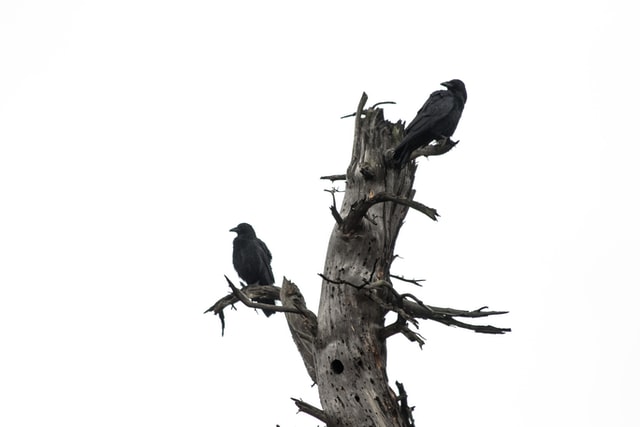
Crows consume nearly anything in general. They are known to eat insects, trash, kitchen scraps, carrion, and roadkill. Crows consume a diverse range of foods.
🐦They eat Seeds
Crows may consume a variety of seeds, including black oil sunflower seeds and pumpkin seeds. When meat scraps and kitchen leftovers are unavailable, they are willing to consume these seeds. Spread these seeds over your yard to feed them.
🐦They eat Fruits
Almost all crow species consume fruits such as apples, bananas, raisins, and so on. They also eat various wild fruits, including dogwood, wild grapes, wild cherries, poison oak, figs, and others. On the other hand, fruits do not appeal to them in the same way that other meals do.
🐦They eat Vegetables
Crows consume vegetables in addition to fruits and berries. Pumpkin, beans, potatoes, and various other household vegetables are among the vegetables. However, if your crows have become accustomed to eating meat daily, transitioning them to veggies may be tough.
🐦They eat Eggs
Crows, unlike other birds, like eating chicken and duck eggs. When the chickens and ducks are not around, they observe and take eggs from their nests. Put some small-sized eggs in your yard if you wish to feed crows chicken or duck eggs.
🐦They eat Nuts
Crows, like other birds, like eating nuts such as peanuts, walnuts, hazelnuts, almonds, pecans, and others. You may also serve shelled or unshelled peanuts to them. They do, however, consume peanuts without salt or sugar.
🐦They eat Grains
Crows consume a variety of grains, including corn, rice, wheat, barley, millet, oats, buckwheat, sorghums, and others. When they can’t find any corpses or tiny animals, these blackbirds rely on grains.
🐦They eat Insects
Crows eat a lot of insects, according to their diet. Therefore, these blackbirds help to maintain the stability of our environment by consuming insects.
🐦They eat Meat
Crows are omnivorous scavengers, as you may well know. These blackbirds primarily consume leftover meat and fat, particularly from chickens and ducks. You may also provide them with raw suet from butcher shops in your area.
🐦They eat Seafood
Crows will consume a variety of foraged marine delicacies such as clams, sea urchins, crabs, and so on. They eat dead fish as well. These black-feathered birds frequently steal fish from eagles and ospreys.
🐦They eat Dead Animals
Crows, while not as omnivorous as hawks and owls, mostly feed on roadkill and dead animals. By consuming dead animals, they help to keep our environment clean.
Frequently Asked Questions
Q: Will crows repel other birds?
A: Not frequently
Q: What is it that crows despise the most?
A: They detest anything sparkling.
Q: What does it signify if crows congregate near your house?
A: They congregate around your home since it may be an excellent source of food for them.
Q: Why do crows going crazy?
A: The simplest and most frequent reason why they congregate in such large flocks is to avoid predators.
Q: Why do crows caw all the time?
A: Their continuous “cawing” may carry on for a very long period since it is how they express their enthusiasm.
Final Thoughts
You can prevent crows from your sight now that you know how to deter them from your yard. You may get rid of them without injuring other birds in the area if you use these methods. Crows are beneficial to our ecosystem because they assist in maintaining balance.

